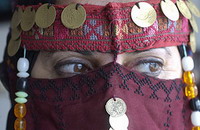Women are allowed to wear face veil in universities
An Egyptian supreme court resolved Saturday that a liberal university in Cairo cannot prohibit women to wear the face veil while inside the campus.

However, the American University in Cairo said the decision by a legal committee of the Supreme Administrative Court was not the final ruling, and that the top court was yet to give its verdict in the five-year-long case.
According to the court official, who spoke on condition of anonymity because he was not authorized to talk to the media, the court's presiding judge, Sayyed Nawfal, turned down a bid submitted by the university to prevent women with face veils from entering the campus.
The university, also known in Cairo as the AUC, has been engaged in a legal battle with Heba el-Zeini, a professor at the Islamic Al-Azhar University who filed a lawsuit in 2001 after the AUC banned her from entering its library wearing a face veil.
At the time, a lower court ruled in favor of el-Zeini, saying she had a right to go into the university wearing a niqab, the Islamic full face veil that leaves only a slit for the eyes.
The AUC appealed the verdict and the case was transferred to the Circuit of Unification of Principles, an 11-judge committee of the Supreme Administrative Court, for a decision.
On Saturday, the committee rejected an absolute ban on the niqab, the court official said. But, it also recommended that women wearing the veil can be made to uncover their face before female security guards as a form of verifying their identity before entering a campus.
The official said the decision will force other universities in Egypt to relinquish existing bans on veils, whether niqabs or hijabs - scarves that cover just the hair, leaving the face visible.
The Egyptian constitution relies in large part on Sharia, or codified Islamic law, which many believe dictates that girls must wear the hijab after puberty. Some scholars believe that the codes also mandate the niqab, but that remains debated.
There is no uniform religious opinion in the Muslim world whether women must wear either the scarf or the veil. Some view various forms of head scarves and niqabs as signs of cultural or Islamic pride, while others see face veils as signs of extremism.
Nizar Mahmoud Ghorab, el-Zeini's lawyer said judge Nawfal's decision was a victory for all Islamic female students.
"This court shut the door in front of anybody who bans the niqab," Ghorab told The Associated Press.
The AUC said it was "consulting with its attorneys."
"The decision, which is not a final ruling for the case, highlights the complexity of the issue placed before the court," the AUC said, adding that the decision by the court committee will now be "transferred" to the Supreme Administrative Court for a judgment.
"While the American University in Cairo has a policy prohibiting face covering as an issue of personal safety and security, it also recognizes the need for respect for the religious values and convictions of our students," the AUC said.
But Ghorab said that after Saturday's decision, AUC's "legal doorways are closed now, they have nothing left but to stall by not admitting the truth."
Sarah Sulieman, an American University female student who appeared in court covered in a black niqab commented on the decision, saying: "Thank God, this is evidence of the justice of the Egyptian judiciary."
"Now any student can enter the university and study freely, while wearing the niqab," she said.
Subscribe to Pravda.Ru Telegram channel, Facebook, RSS!




